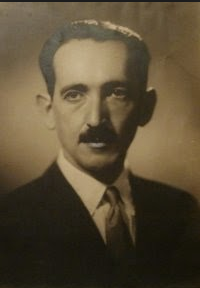
Plínio Salgado was a Brazilian politician, writer, journalist, and theologian. He founded and led Brazilian Integralist Action, a political party inspired by the Fascist regimes of Benito Mussolini and Adolf Hitler.

Luís Carlos Prestes was a lieutenant, later communist militant and Brazilian politician. He was one of the organizers of the 1920s tenente revolts and the communist opposition to the Vargas Era in Brazil. He was also the general-secretary of the Brazilian Communist Party.

The Vargas Era is the period in the history of Brazil between 1930 and 1945, when the country was under the dictatorship of Getúlio Vargas.

Second Brazilian Republic is the period of Brazilian history between 1946 and 1964 also known as the "Republic of 46". It was marked by political instability and military's pressure on civilian politicians which ended with the 1964 Brazilian coup d'état and establishment of Brazilian military government.

The Brazilian Socialist Party is a political party in Brazil. It was founded in 1947, before being abolished by the military regime in 1965 and re-organised in 1985 with the re-democratisation of Brazil. It elected six Governors in 2010, becoming the second largest party in number of state governments, behind only PSDB. In addition to that, it won 34 seats in the Chamber of Deputies and three seats in the Senate, besides having been a member of the For Brazil to Keep on Changing coalition, which elected Dilma Rousseff as President of Brazil.

The National Democratic Union was a political party that existed in Brazil between 1945 and 1965. It was ideologically aligned with conservatism. During most of its existence, it was the country's second-strongest party. Its symbol was an Olympic torch and its motto was "The price of freedom is eternal vigilance", a quote falsely attributed to Thomas Jefferson.

The Revolution of 1930, also known as the 1930coup d'état or coup of 1930 was an armed movement in Brazil led by the states of Minas Gerais, Paraíba and Rio Grande do Sul, culminating in a coup. The revolution ousted President Washington Luís on October 24, 1930, prevented the inauguration of President-elect Júlio Prestes, and ended the Old Republic.

General elections were held in Brazil on 2 December 1945, the first since the establishment of Getúlio Vargas' Estado Novo. The presidential elections were won by Eurico Gaspar Dutra of the Social Democratic Party (PSD), whilst the PSD also won a majority of seats in both the Chamber of Deputies and the Senate. Voter turnout was 83.1% in the presidential election, 83.5% in the Chamber elections and 76.7% in the Senate elections.

General elections were held in Brazil on 3 October 1950. The presidential elections were won by Getúlio Vargas of the Brazilian Labour Party, whilst the Social Democratic Party remained the largest party in both the Chamber of Deputies and the Senate, although they lost their majority in the former. Voter turnout was 72.1% in the presidential election, 72.0% in the Chamber elections and 77.7% in the Senate elections.

General elections were held in Brazil on 1 March 1930. In the presidential elections the result was a victory for Júlio Prestes of the Republican Party of São Paulo, who received 57.7% of the vote.

Presidential elections were held in Brazil on 3 October 1955. The result was a victory for Juscelino Kubitschek, who received 35.7% of the vote. Voter turnout was 59.7%.

The Brazilian Labour Party is a political party in Brazil founded in 1981 by Ivete Vargas, niece of President Getúlio Vargas. It claims the legacy of the historical PTB, although many historians reject this because the early version of PTB was a center-left party with wide support in the working class. Despite the name suggesting a left unionist labor party, the PTB joined a coalition which is by the centre/centre-right PSDB.
The Brazilian Labour Party was a centre-left populist political party in Brazil founded in 1945 by supporters of President Getúlio Vargas. It was dismantled by the military after 1964 coup d'état.

Events in the year 1930 in Brazil.

Events in the year 1934 in Brazil.

Events in the year 1937 in Brazil.

Events in the year 1945 in Brazil.

Events in the year 1954 in Brazil.











